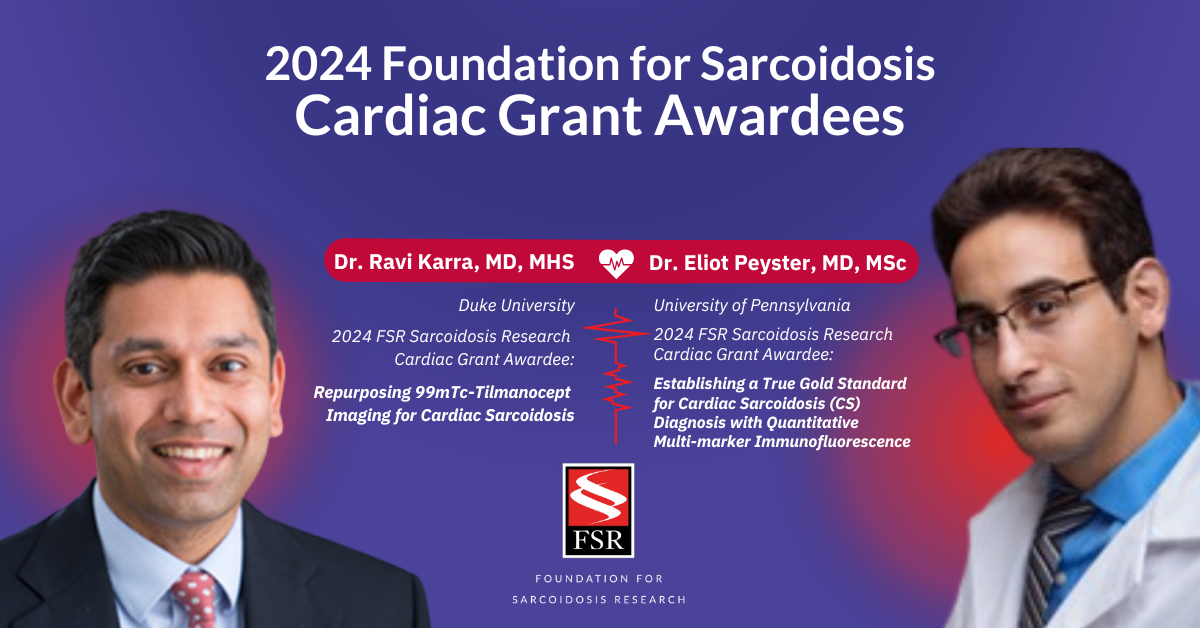CHICAGO, Nov. 27, 2024 (GLOBE NEWSWIRE) -- The Foundation for Sarcoidosis Research (FSR) is proud to announce the recipients of the 2024 FSR Cardiac Sarcoidosis Grant, providing $200,000 in funding to advance groundbreaking research aimed at improving the diagnosis, management, and treatment of cardiac sarcoidosis and doubling FSR’s investment from 2023.
FSR has awarded two grants, each in the amount of $100,000, to Dr. Eliot Peyster, MD, MSc, Assistant Professor of Medicine at the University of Pennsylvania, and Dr. Ravi Karra, MD, MHS, Associate Professor of Medicine and Pathology at Duke University. These grants support innovative projects designed to improve diagnostic accuracy and clinical care for cardiac sarcoidosis patients.

Dr. Peyster’s research project, Establishing a True Gold Standard for Cardiac Sarcoidosis Diagnosis with Quantitative Multi-marker Immunofluorescence, applies advanced spatial biology techniques to create a new diagnostic gold standard for cardiac sarcoidosis, leveraging quantitative multi-marker immunofluorescence. His expertise spans cardiovascular diseases, heart failure, and translational research, with a focus on adapting cutting-edge technologies to improve patient care.
“This generous award from the FSR will enable us to test a novel, modern, and very promising new approach to diagnosing cardiac sarcoidosis,” says Dr. Peyster. “The work we will perform as part of this award has the potential to be practice-changing and will hopefully lead to earlier disease detection and better outcomes for patients.”
Dr. Karra’s research project, Repurposing 99mTc-Tilmanocept Imaging for Cardiac Sarcoidosis, focuses on adapting macrophage-specific imaging agents to improve cardiac sarcoidosis diagnosis and monitoring. His translational program at Duke University combines developmental biology and epidemiology to advance early-phase clinical trials and improve care for heart failure patients.
“With generous support from the Foundation for Sarcoidosis Research, we are excited to test whether an imaging agent specific to macrophages can be used to better diagnose and follow cardiac sarcoidosis,” says Dr. Karra. “This work is part of a bench-to-bedside approach from my lab and has the potential to address a significant, unmet need in the field of sarcoidosis.”
"We are thrilled to support these extraordinary projects through FSR’s Cardiac Sarcoidosis Grant," says Mary McGowan, FSR's CEO. "The insights gained from this research have the potential to revolutionize the diagnosis, outcome evaluation, and treatment strategies not only for individuals with cardiac sarcoidosis but also for a wide range of other inflammatory diseases."
FSR is dedicated to accelerating sarcoidosis research through its fellowships, pilot and cardiac grants, and other disease-specific initiatives. To date, FSR has provided more than $7 million in funding to support sarcoidosis research worldwide.
To learn more about FSR’s funding opportunities, visit https://www.stopsarcoidosis.org/fsr-grants/.
About Sarcoidosis
Sarcoidosis is a rare inflammatory disease characterized by granulomas—tiny clumps of inflammatory cells—that can form in one or more organs. Despite advances in research, sarcoidosis remains challenging to diagnose, with limited treatment options and no known cure. Approximately 175,000 people live with sarcoidosis in the United States.
About the Foundation for Sarcoidosis Research
The Foundation for Sarcoidosis Research (FSR) is the leading international organization dedicated to finding a cure for sarcoidosis and improving care for those living with the disease through research, education, and support. For more information about FSR and its community programs, visit: www.stopsarcoidosis.org.
Media contact:
Cathi Davis
Director of Communications and Marketing
312-341-0500
A photo accompanying this announcement is available at https://www.globenewswire.com/NewsRoom/AttachmentNg/6e117b7a-964e-442d-b5ed-d7fff74c93b9















